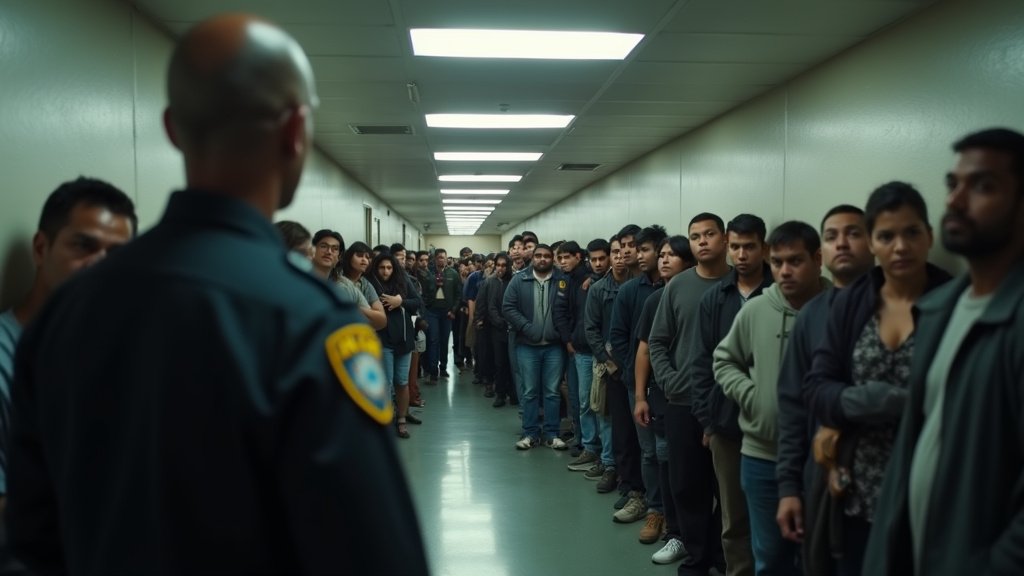ICE Hospital Surveillance: Agents Monitor Detained Woman 24/7, Pressure Her to Leave Hospital
The critical issue of ICE hospital surveillance was brought to the forefront by the case of Milagro Solis-Portillo, a detained Salvadoran woman. For two weeks in Los Angeles hospitals, ICE agents maintained constant 24/7 ICE hospital surveillance and pressured her to leave against her doctor’s orders. This incident raised serious alarms about potential ICE surveillance in healthcare settings and the impact on patient privacy rights.
Medical Emergency and ICE Surveillance Tactics
Solis-Portillo suffered a medical emergency while detained, leading federal immigration agents to take her to Glendale Memorial Hospital in July. However, agents remained by her side, using contractors who guarded her in shifts, maintaining continuous ICE surveillance. Her attorney, Ming Tanigawa-Lau, noted this invasive monitoring and the impact of these ICE surveillance tactics.
Hospital Stays and the Pressure of ICE: Understanding ICE Hospital Surveillance
ICE later transferred Solis-Portillo to Anaheim Global Medical Center, a move that defied her doctor’s advice and was done without explanation. At this new hospital, agents remained in her room constantly, listening to private conversations. Solis-Portillo reported that agents pressured her to self-discharge, claiming she was well enough to leave. They also threatened she could not see family or speak to her attorney until she complied, describing the experience as torture, highlighting the pressure often associated with ICE hospital surveillance.
Patient Rights and Conflicting ICE Policies on Surveillance
Detained patients have a right to private medical care and confidential consultations with attorneys. However, enforcing these hospital patient rights can be complex due to federal authority. While ICE agents can be present and escort patients, constitutional rights and protections like HIPAA regarding healthcare privacy still apply, and illegal ICE surveillance could constitute HIPAA violations. California law also offers additional Los Angeles protections against intrusive immigration enforcement and ICE surveillance.
Concerns Over Privacy and Compromised Care with ICE Hospital Surveillance
The continuous ICE presence creates fear within immigrant communities, potentially deterring them from seeking necessary medical care and leading to worsened health outcomes. Hospitals should be sanctuaries for healing, not sites for healthcare immigration enforcement. This incident revealed a profound breach of trust and highlighted the negative impact of aggressive ICE hospital surveillance on medical care access.
Los Angeles County Acts for Patient Safety and Against ICE Surveillance
Growing concerns from this event, coupled with similar incidents, prompted action from the Los Angeles County Board of Supervisors. On November 18th, they approved new protections for county facilities aimed at securing patient privacy and curbing ICE surveillance. These new protections require patient consent for releasing information to family and counsel. Staff must ensure agents leave patient rooms to protect private conversations and support patient dignity. Supervisors Hilda L. Solis and Holly J. Mitchell championed these measures, supporting Senate Bill 81. This California law enhances protections by mandating specific actions, such as designating nonpublic areas to prevent enforcement in patient care spaces and prohibiting disclosure of medical information without a warrant, thereby limiting ICE’s ability to conduct ICE hospital surveillance in sensitive areas.
Navigating Legal and Ethical Boundaries of ICE Hospital Surveillance
Legal experts explain that while ICE has the authority to guard detainees and escort them for medical treatment, laws like HIPAA regarding healthcare privacy remain paramount. Patients have the right to private conversations with providers and confidential consultations with lawyers. These sensitive discussions should be free from the scrutiny of ICE agents, though enforcement realities can sometimes differ. ICE’s own standards allow for detainee communication and family visits, but these are not always strictly adhered to, complicating the issue of ICE hospital surveillance and potentially leading to HIPAA violations.
State Support for Immigrant Legal Services Amidst ICE Surveillance Concerns
This situation occurs within a broader context of California addressing immigrant needs. The state allocated $25 million to support immigrant legal services and vulnerable populations, including funding for legal aid and immigration services. This ensures representation, which is critical for navigating deportation cases and safeguarding civil liberties against aggressive immigration enforcement, including intrusive ICE hospital surveillance.
ICE’s Official Stance on Hospital Surveillance
ICE provided a statement on the case, noting Solis-Portillo was in the U.S. illegally and had prior removals and arrests for various offenses. ICE asserted its commitment to humane environments and comprehensive medical care for those in custody, though this statement did not directly address the specific concerns regarding their hospital surveillance practices, including the specific instance of ICE hospital surveillance.
Deterrent Effect of ICE Surveillance on Healthcare Access
The visible presence of ICE agents in hospitals has significant consequences. Some local hospitals reported a substantial increase in patient no-shows and cancellations following enhanced enforcement. For instance, Los Angeles General Medical Center saw appointment rates double, and St. John’s clinics reported a 30% rise in cancellations. This trend, driven by fear of immigration enforcement and ICE hospital surveillance, impacts medical care access for detained immigrant care patients and poses a risk to both individual and public health.
Conclusion: A Struggle for Dignity and Rights Against ICE Surveillance
The case of Milagro Solis-Portillo is significant, highlighting the ongoing tensions between immigration enforcement and hospital patient rights, particularly concerning ICE hospital surveillance. The new Los Angeles protections enacted in Los Angeles County are a crucial step toward restoring patient privacy and dignity. However, effective enforcement and clearer guidelines are vital to protect vulnerable individuals. Hospitals must remain safe havens prioritizing patient care over immigration enforcement. This featured Los Angeles news underscores a broader fight impacting the health and rights of many in the face of pervasive ICE surveillance.





